
NYU's Center for Social Media and Politics
@csmapnyu.org
We work to strengthen democracy by conducting rigorous research, advancing evidence-based public policy, and training the next generation of scholars.
https://csmapnyu.org/links
https://csmapnyu.org/links
Reposted by NYU's Center for Social Media and Politics
The paper is co-authored with Bernhard Von Clemm, @ericka.bric.digital
@jonathannagler.bsky.social @magdalenawojciesza.bsky.social
This is also one of the projects I started at @csmapnyu.org ---- thanks to the entire lab involved!
The paper can be found here: www.cambridge.org/core/journal...
@jonathannagler.bsky.social @magdalenawojciesza.bsky.social
This is also one of the projects I started at @csmapnyu.org ---- thanks to the entire lab involved!
The paper can be found here: www.cambridge.org/core/journal...
Survey Professionalism: New Evidence from Web Browsing Data | Political Analysis | Cambridge Core
Survey Professionalism: New Evidence from Web Browsing Data
www.cambridge.org
October 7, 2025 at 6:49 PM
The paper is co-authored with Bernhard Von Clemm, @ericka.bric.digital
@jonathannagler.bsky.social @magdalenawojciesza.bsky.social
This is also one of the projects I started at @csmapnyu.org ---- thanks to the entire lab involved!
The paper can be found here: www.cambridge.org/core/journal...
@jonathannagler.bsky.social @magdalenawojciesza.bsky.social
This is also one of the projects I started at @csmapnyu.org ---- thanks to the entire lab involved!
The paper can be found here: www.cambridge.org/core/journal...
Read a longer summary of the paper here: csmapnyu.org/research/aca...
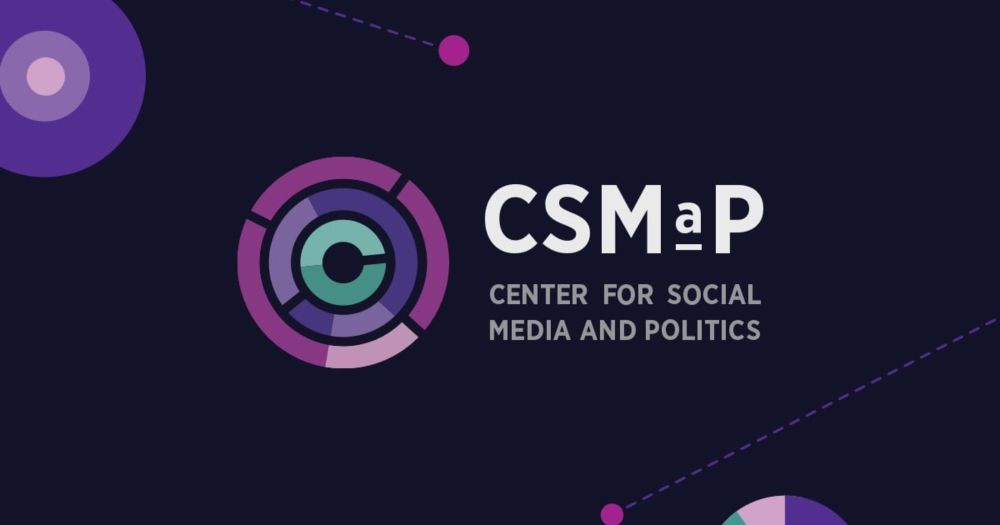
Misinformation Beyond Traditional Feeds: Evidence from a WhatsApp Deactivation Experiment in Brazil - NYU’s Center for Social Media and Politics
csmapnyu.org
July 17, 2025 at 2:52 PM
Read a longer summary of the paper here: csmapnyu.org/research/aca...
Congrats to the authors @tiagoventura.bsky.social, @rmajumdar.bsky.social, Jonathan Nagler, and @jatucker.bsky.social.
The paper, which is accepted for publication at @The_JOP, can be found here: www.journals.uchicago.edu/doi/epdf/10....
The paper, which is accepted for publication at @The_JOP, can be found here: www.journals.uchicago.edu/doi/epdf/10....
University of Chicago Press Journals: Cookie absent
www.journals.uchicago.edu
July 17, 2025 at 2:51 PM
Congrats to the authors @tiagoventura.bsky.social, @rmajumdar.bsky.social, Jonathan Nagler, and @jatucker.bsky.social.
The paper, which is accepted for publication at @The_JOP, can be found here: www.journals.uchicago.edu/doi/epdf/10....
The paper, which is accepted for publication at @The_JOP, can be found here: www.journals.uchicago.edu/doi/epdf/10....
Our study was a rare field experiment on misinformation in the Global South, adding to a growing call to broaden the geographic and platform scope of causally identified misinformation research.
July 17, 2025 at 2:51 PM
Our study was a rare field experiment on misinformation in the Global South, adding to a growing call to broaden the geographic and platform scope of causally identified misinformation research.
Big takeaway: WhatsApp matters—but changing exposure does not mechanically change attitudes in the short run.
Political beliefs are hard to change and probably require long-term interventions.
Political beliefs are hard to change and probably require long-term interventions.
July 17, 2025 at 2:51 PM
Big takeaway: WhatsApp matters—but changing exposure does not mechanically change attitudes in the short run.
Political beliefs are hard to change and probably require long-term interventions.
Political beliefs are hard to change and probably require long-term interventions.
The paper also indicates:
➡️ Platforms like WhatsApp differ fundamentally from traditional feed-based platforms;
➡️ The academic community must spend time studying such platforms; and,
➡️ While difficult to study, it's crucial to explore how those in the Global Majority consume information
➡️ Platforms like WhatsApp differ fundamentally from traditional feed-based platforms;
➡️ The academic community must spend time studying such platforms; and,
➡️ While difficult to study, it's crucial to explore how those in the Global Majority consume information
July 17, 2025 at 2:51 PM
The paper also indicates:
➡️ Platforms like WhatsApp differ fundamentally from traditional feed-based platforms;
➡️ The academic community must spend time studying such platforms; and,
➡️ While difficult to study, it's crucial to explore how those in the Global Majority consume information
➡️ Platforms like WhatsApp differ fundamentally from traditional feed-based platforms;
➡️ The academic community must spend time studying such platforms; and,
➡️ While difficult to study, it's crucial to explore how those in the Global Majority consume information
These findings have a key nuance: heavy WhatsApp users—those who frequently receive political content—did improve in spotting falsehoods, while others did not.
This suggests that information interventions may have unequal impacts across subgroups, depending on baseline exposure.
This suggests that information interventions may have unequal impacts across subgroups, depending on baseline exposure.
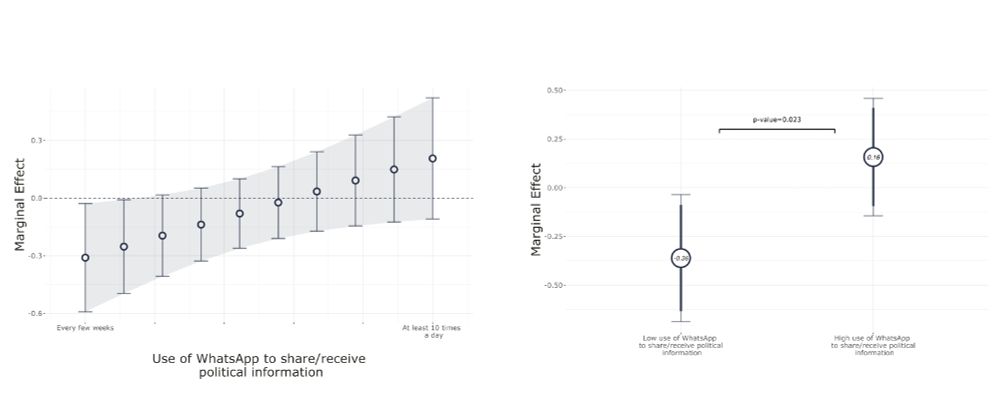
July 17, 2025 at 2:51 PM
These findings have a key nuance: heavy WhatsApp users—those who frequently receive political content—did improve in spotting falsehoods, while others did not.
This suggests that information interventions may have unequal impacts across subgroups, depending on baseline exposure.
This suggests that information interventions may have unequal impacts across subgroups, depending on baseline exposure.
Importantly, we also found no evidence that treated users substituted WhatsApp with other platforms.
Users did not migrate to Facebook, Instagram, or Telegram, but instead, watched a bit more TV.
Users did not migrate to Facebook, Instagram, or Telegram, but instead, watched a bit more TV.
July 17, 2025 at 2:51 PM
Importantly, we also found no evidence that treated users substituted WhatsApp with other platforms.
Users did not migrate to Facebook, Instagram, or Telegram, but instead, watched a bit more TV.
Users did not migrate to Facebook, Instagram, or Telegram, but instead, watched a bit more TV.
We are not the first, and unlikely to be the last, to find such mixed results.
Our findings echo recent Facebook deactivation studies & RCTs manipulating online informational spaces (e.g., re-shares, algorithmic feeds, landing pages) that show largely null effects on users’ attitudes.
Our findings echo recent Facebook deactivation studies & RCTs manipulating online informational spaces (e.g., re-shares, algorithmic feeds, landing pages) that show largely null effects on users’ attitudes.
July 17, 2025 at 2:51 PM
We are not the first, and unlikely to be the last, to find such mixed results.
Our findings echo recent Facebook deactivation studies & RCTs manipulating online informational spaces (e.g., re-shares, algorithmic feeds, landing pages) that show largely null effects on users’ attitudes.
Our findings echo recent Facebook deactivation studies & RCTs manipulating online informational spaces (e.g., re-shares, algorithmic feeds, landing pages) that show largely null effects on users’ attitudes.
These findings are consistent with the “minimal effects” theory: the misinformation reduction did not translate to user belief accuracy and polarization changes.
Although users saw less false content, their attitudes stayed the same.
Although users saw less false content, their attitudes stayed the same.
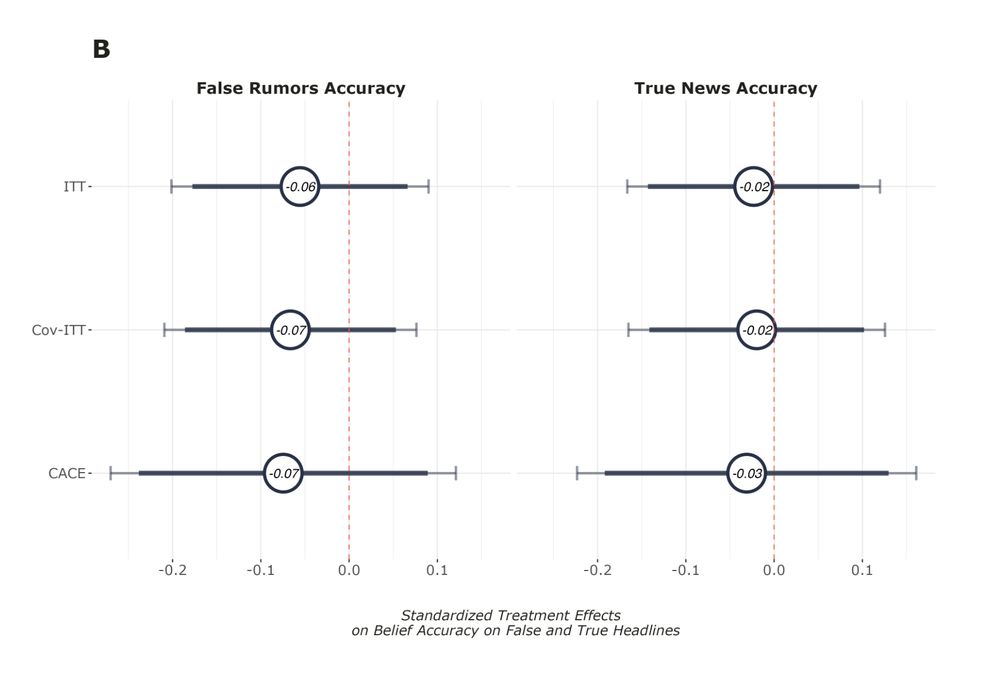
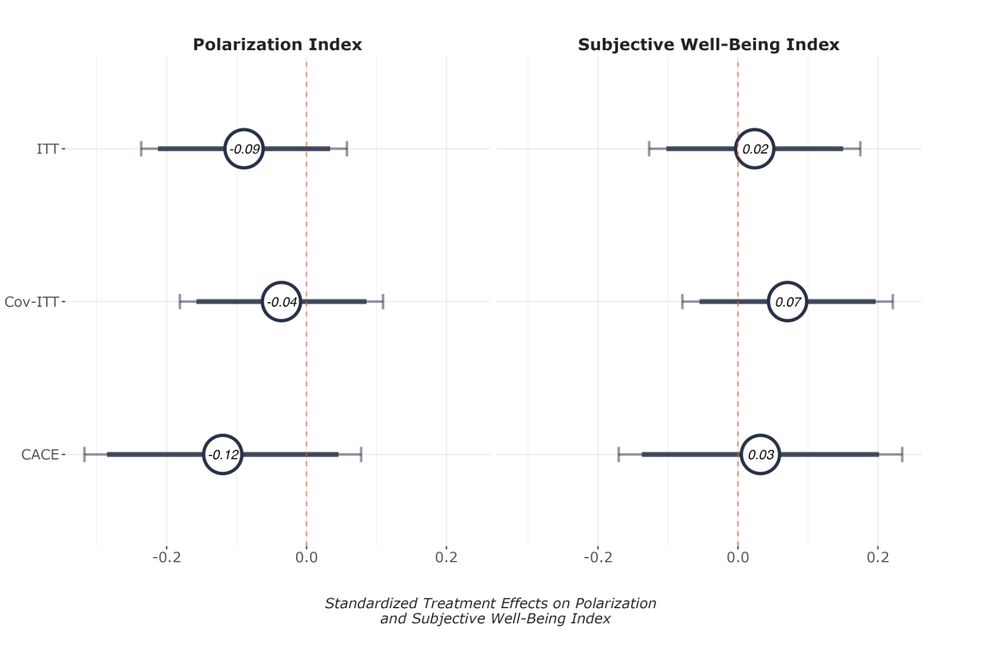
July 17, 2025 at 2:51 PM
These findings are consistent with the “minimal effects” theory: the misinformation reduction did not translate to user belief accuracy and polarization changes.
Although users saw less false content, their attitudes stayed the same.
Although users saw less false content, their attitudes stayed the same.
Overall, the recall of misinformation dropped sharply.
Participants were 40% less likely to remember false headlines, a significantly larger reduction than the decline in recall of true news.
Participants were 40% less likely to remember false headlines, a significantly larger reduction than the decline in recall of true news.
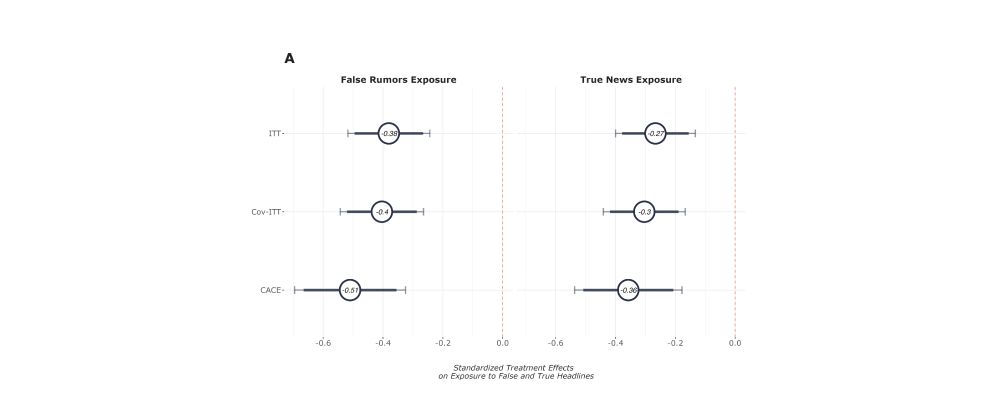
July 17, 2025 at 2:51 PM
Overall, the recall of misinformation dropped sharply.
Participants were 40% less likely to remember false headlines, a significantly larger reduction than the decline in recall of true news.
Participants were 40% less likely to remember false headlines, a significantly larger reduction than the decline in recall of true news.
Our design recruited 773 WhatsApp users before the 2022 election. The treatment group (N≈400) turned off all auto-downloads (videos, images, audio, & docs) for 3 weeks, while the control group kept their usual settings. We also verified compliance weekly via storage screenshots.
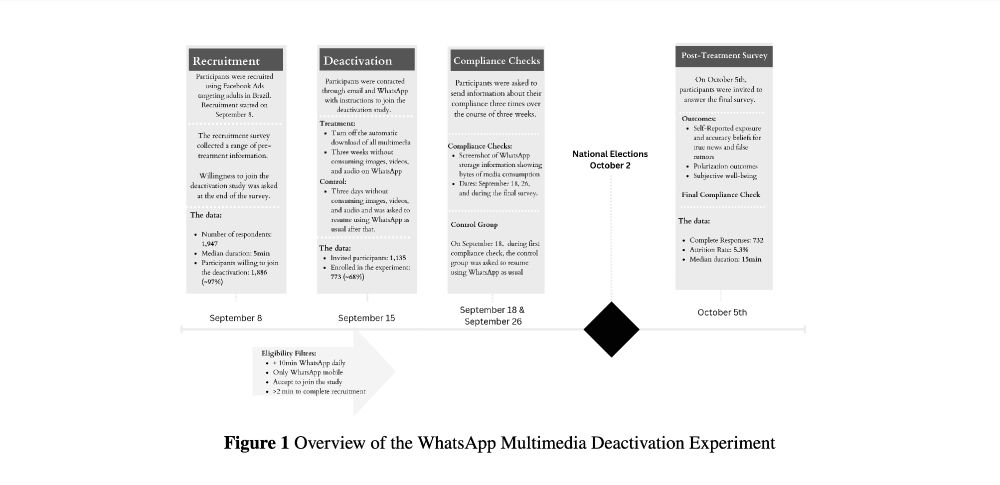
July 17, 2025 at 2:51 PM
Our design recruited 773 WhatsApp users before the 2022 election. The treatment group (N≈400) turned off all auto-downloads (videos, images, audio, & docs) for 3 weeks, while the control group kept their usual settings. We also verified compliance weekly via storage screenshots.
We extend a well-known method for measuring social media’s causal effects in two directions:
1. Applying it to WhatsApp (not a feed-based platform).
2. Focusing on multimedia—the modal format of misinformation spread on WhatsApp.
1. Applying it to WhatsApp (not a feed-based platform).
2. Focusing on multimedia—the modal format of misinformation spread on WhatsApp.
July 17, 2025 at 2:51 PM
We extend a well-known method for measuring social media’s causal effects in two directions:
1. Applying it to WhatsApp (not a feed-based platform).
2. Focusing on multimedia—the modal format of misinformation spread on WhatsApp.
1. Applying it to WhatsApp (not a feed-based platform).
2. Focusing on multimedia—the modal format of misinformation spread on WhatsApp.
What makes WhatsApp unique?
Despite no news feed, millions of Brazilians use it as a key source of political information.
But it's also where they see the most misinformation, primarily via viral videos/images & group chats.
So we designed a deactivation experiment for this landscape.
Despite no news feed, millions of Brazilians use it as a key source of political information.
But it's also where they see the most misinformation, primarily via viral videos/images & group chats.
So we designed a deactivation experiment for this landscape.
July 17, 2025 at 2:51 PM
What makes WhatsApp unique?
Despite no news feed, millions of Brazilians use it as a key source of political information.
But it's also where they see the most misinformation, primarily via viral videos/images & group chats.
So we designed a deactivation experiment for this landscape.
Despite no news feed, millions of Brazilians use it as a key source of political information.
But it's also where they see the most misinformation, primarily via viral videos/images & group chats.
So we designed a deactivation experiment for this landscape.

